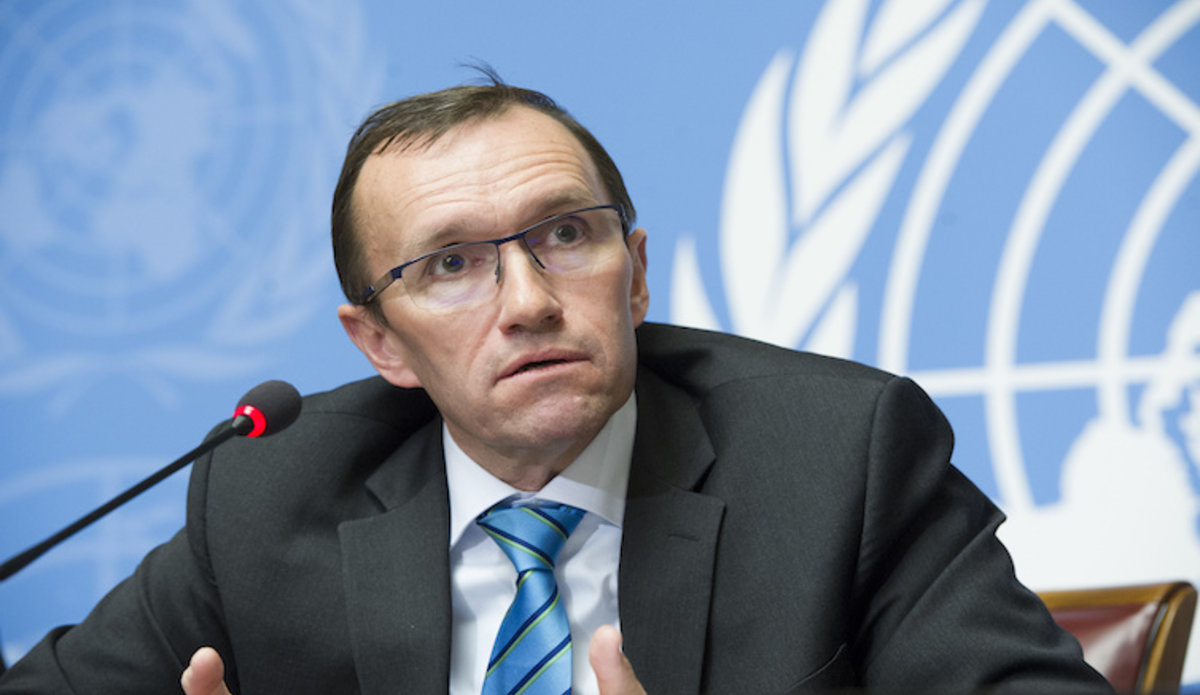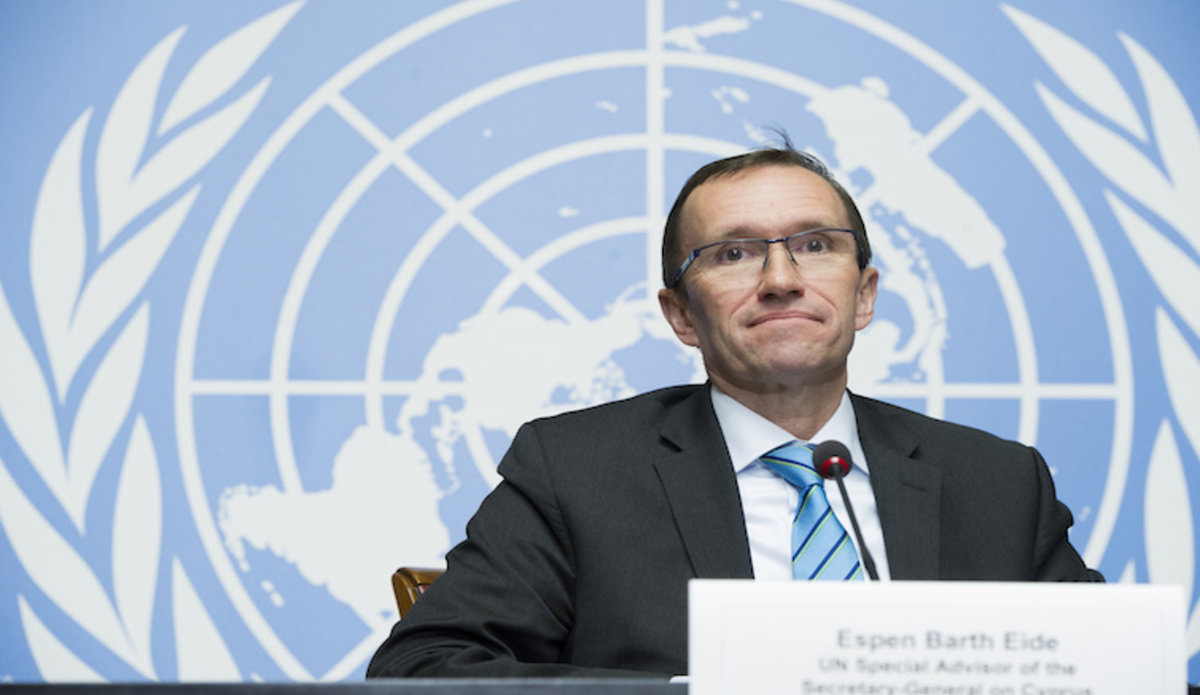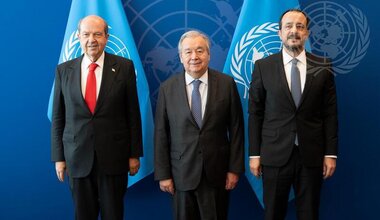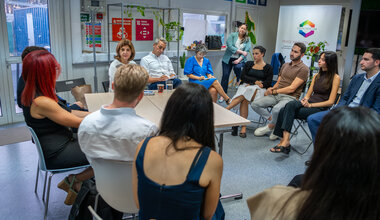Press Conference by Espen Barth Eide, Special Adviser of the UN Secretary-General on Cyprus, on the start of the Cyprus talks at the Palais des Nations
Espen Barth Eide, Special Adviser to the United Nations Secretary-General on Cyprus: Thank you, good afternoon, as you know, we have just started the Cyprus talks here in Geneva. This is a continuation of the bi-communal talks that take part in Cyprus itself and which have effectively led us to where they are now by Mr. Nico Anastasiades, the Greek Cypriot leader, and Mr. Mustafa Akinci, the Turkish Cypriot leader, who are both here with large delegations.
Over these last 19 months, there has been significant progress on all of the five chapters that can eventually be solved by the Cypriots themselves, so much that the two leaders agreed to come here and to try to wrap up all or almost all those still outstanding issues that they can effectively deal with only by themselves.
In order to lay the groundwork for an international conference on Cyprus, which will convene here in Geneva in the Palais des Nations on the morning of Thursday, the 12th of January, where we will have the added participation of the guarantor powers - Greece, Turkey and the United Kingdom and the EU [European Union] in a special observer role, together with the delegation from Cyprus, and who will then jointly try to solve the large and challenging issues pertaining to the security and guarantees chapter. I think many of the questions will be about the 12th [January, date of the Conference on Cyprus], but I want to say that the 12th will only be effective if we are successful between the 9th and 11th. We have a clear agreed structure on how to organize the hours we have on all these issues because in every single chapter there is one or more issues that still has to be solved, and frankly almost all talks of this character are such that there are certain issues that either side reserve to the final moment.
We are now in the final moment. We are really at the moment of truth. This is where we actually will find out if this can be solved. I am not saying on a specific date, because it is open-ended. The Conference starts on the 12th but we haven’t said when it will end. My very strong sense is the following: this is going to be difficult, but it’s possible. It’s going to be difficult because obviously, even if the majority of issues have been solved in all chapters, it is not the easiest questions that we have left until the end. As normal, it is some of the most complicated, or most emotional issues that we have left to the end, and this is the nature of this kind of talks. Hence, it is complicated, and I think I will plead for some respect for the leaders who are showing a lot of courage, a lot of will, leadership and trust in each other, that even if they want a solution, it’s not easy to make these final agreements that they are trying to achieve. But it’s also possible because I don’t know any issue in these negotiations that really cannot be solved, if sufficient will is available. I want to reiterate before we open up for questions that the Conference on the 12th will happen, but the quality of the conference on the 12th very much depends on the discussions from 9 to 11. It’s an international conference, it’s a UN [United Nations] conference under the auspices of the UN Secretary-General. All these parties are necessary because we are discussing a security arrangement around the embryonic federal solution in Cyprus, which has to involve both the guarantor powers because of the existence of three treaties, which are still valid, and of course also the European Union in the sense that this united country if it ever becomes a reality will be a full member of the EU, so this is the reason for this particular setup.
We are delighted as the UN to facilitate this. It’s been hard work but extremely rewarding to chair these talks all until now, but I want to underline that these talks are fully led by and owned by the Cypriots. It’s the leaders in Cyprus that are responsible for every single sentence, every single word, in the talks. There is no kind of UN arbitration and there will not be. And I say that very securely: we are not trying what was tried in 2004. The two leaders are the ones who are responsible now, but at the end of the day, through referenda, in the two communities in Cyprus, it will be all Cypriots who make up their mind about this.
If it succeeds, I think this is historic for the Cypriots. It took several generations to solve this problem over the divided island, but I also think that this would send a very strong signal to a world and a region where there are many wars and many things breaking apart. Allow me to quote my good friend Staffan de Mistura, who is in charge of an even bigger problem, Syria. He reminded me that a sign of some progress could be helpful also for other processes around the world.
Question: Hello Mr. Eide, thank you for your briefing. You said the UN does not have an arbitration role, but back in Cyprus, in an interview we had, you had told me that in the security and guarantees chapter you had a different role where some arbitration was also included. Is the UN now arbitrating the guarantees and security chapter, is it doing some kind of a shuttle diplomacy between the guarantor powers and the sides, what is exactly your role right now in that specific topic?
Mr. Eide: Thank you for asking because we are not in the business of arbitrating even this chapter, and we will not be. However, because this involves several players and not only the two sides in Cyprus, it has a somewhat different nature and that’s why I spent much of my own time in travels and discussions with Turkey, Greece and the UK [United Kingdom] over the last weeks in order to ensure that our preparations are as best as they can for the 12th. There is still work to be done. So shuttle diplomacy, absolutely, but arbitration, no.
Question: Can you be more specific about the EU role at the conference? You said it will be an observer. What does this mean, practically I mean?
Mr. Eide: The participants of the conference are of course the Cypriots, Mr. Anastasiades and Mr. Akinci, and the guarantor powers - Turkey, Greece and the UK. Those are the participants. We agree that the EU is an interested party since the united Cyprus will be a member of the European Union, and the European Union has a role to play, and it has also been constructively engaged throughout. They will be present and helpful - of course now on a much higher level - as they have been throughout the process through their representation in Cyprus. So when we need advice, inputs, we invite the EU in, which does not mean they are in a decision-making role, but they are in a supportive role.
Question: Can you share any information about the level of participation on the 12th from the guarantor powers, or are there any signals of who’s going to participate from where?
Mr. Eide: As of right now, there are conversations between us, and the guarantor powers and between the guarantor powers among themselves, about this issue. They will be represented here at the highest or the second highest level and that decision is still to be made. And of course they will also look to each other when they make their decision. But I want to use your question to reiterate an important point. All of them, and particularly Turkey and Greece, are almost in unison on saying we are also watching what is happening between the 9th and the 11th, because if we come, we want to know that all or most of the other issues are behind us or in the way to a final settlement. They are not interested in being party to discussions that should and will be left to the Cypriots. So there is a relationship between these two things, but the concrete answer is the highest or the second highest level available.
Question: I was wondering sir if you could elaborate on what are your views on the treaty of alliance and if it’s a dead letter or still valid. Thank you.
Mr. Eide: Legally speaking these treaties are there, right, and if you want to change them, they have to be changed by those who signed them in the first place. So in that sense, they are not a dead letter, but the ambition here is to develop a twenty-first century security arrangement, which will cater to the security concerns of both communities. This is what many of the discussions are now about and this issue in Cyprus of course also has to be reconciled with the broader policies of the neighbouring States, and my hope as the Special Adviser on Cyprus is that we will have our primary attention on the interests and the needs of the Cypriots in Cyprus and that other players will see that as the key to how we find a solution to also this question.
Question: Thank you Mr. Eide for coming and talking to us. You said earlier that the quality of the 12th of January meeting will very much depend on the January 9 th to 11 th discussions, but at the same time, the January 9 to 11 discussions will depend on the expectations of the 12th. So how do you square that circle without a time machine? Is there some kind of parallel negotiations taking place also on the international aspects of an agreement?
Mr. Eide: I would not use the word negotiations because I think they will only happen here in a more formal sense of the word, but there are daily exchanges between the key players and also between them and the Secretary-General. I want to underline that Secretary-General Guterres has been engaging almost daily. I have been speaking to him daily and more importantly, he has been talking to the key players, the Cypriot leaders and also the guarantor powers. So there is a lot of activity going on, but as to negotiations, I think we will only see this here from the 12th onwards.
As for the level of participation, the level on the first day is not necessarily the level on the last day, because it is relatively common that you start at a certain level and then you calibrate. So I wouldn’t stake whatever happens on the 12th as the final answer to that question. Normally, very few negotiations start at the highest possible level; you start at the lower level and escalate to the top when something is either ready to be signed or where some kind of final top-level agreement has to happen.
Question: You mentioned that there were a number of chapters that still have points that need to be addressed. I was hoping that you might be able to address particularly the subjects that were discussed this morning, and whether or not there was progress made in that arena. I am particularly thinking about if you think that it’s feasible that there can be an agreement on how many people can reclaim property that leaves both sides satisfied, and if progress is not made, could that jeopardize the visit of Mr. Erdogan and Mr. Tsipras and Ms. May later this week. Thank you.
Mr. Eide: Well, as you correctly said, this morning, the main topic was property. It’s a large and complicated chapter where there has been for almost a year a broad outline of an agreement to the general principles. But to be frank, we have been stuck on some issues which are large or small depending on how you see them, particularly, and this is well known to the Cypriots in the room, the issue of how to define the concept of emotional link and a couple of other issues. We need to solve these issues as I don’t think it is possible to see a solution in Cyprus without a solution to these issues, so we are going to work hard and we will come back to them. It was a good start today, we had a good conversation, but the leaders decided to set up a small working group which will be meeting now in the lunch break to try to solve some issues that they pose, with the ambition to find mutually agreeable outcomes that would create a level of certainty for those who need certainty and a space for further development for those who need that.
Question: So also on the issue of the chapters, you say there are issues remaining in all the different chapters, are there any specific chapters where you think you are particularly close to closing them? Could you say what you are planning to discuss when they come back later this evening to talk? Thank you.
Mr. Eide: So, they have had their first round on property as I mentioned and this working group will come back what they are ready. We are talking within the coming hours and days. They started on governance, where much is solved, but at least one major issue is outstanding. There will be a brain storming this afternoon on security and guarantees, in order to prepare for the 12th, because I want a little bit more clarity from the leaders on what signals the Secretary-General and I should send to other relevant players. Then they will go back to governance, which is a large chapter. You asked about the chapters where we are close. I would say, tomorrow we have economy and EU, where there isn’t really anything dramatic left to be done, and then we will also have a discussion on implementation. I want to underline the importance of implementation. One thing is, in one sense we are working on two levels, one is the political agreement. There is also an implementation discussion which is very important. On Wednesday we will have territory, we will then come back to property, and then what we call leftovers. I can say their leaders agreed yesterday on a schedule and we are so far, at these early hours, on schedule.
Question: I would like to ask you, could you please tell us, concerning the period between, before Mont Pèlerin and now, about the number of the convergences, have the leaders managed to reach more convergences in this period or not? Are the number of convergences still the same as before Mont Pèlerin?
Mr. Eide: In my view there are a number of new convergences, on issues like policing and other aspects of internal security, not to be confused with the international security and guarantees. We had progress on the implementation discussion and we had progress on the economy chapter. We could have hoped for even more. But there has been a drive forward to this meeting. And I also want to say, as I said at the beginning: there are certain issues that you could be walking around in circles for another half year [and] you would not solve them before you are in this kind of environment. And this is based on experience from other places. I think my role as a facilitator is to try to structure the discussion such that we get the necessary energy and the necessary process right in order to capture this momentum, which is right now.
Question: If, for unforeseen circumstances, the talks do not deliver, which we all expect they will, what is the next step? Will the international conference go ahead, and what would be the ground for the international conference to go ahead, because if there is no talks to negotiate, then what would the international conference go ahead for? And second question: the three guarantor powers are guarantors of the Republic of Cyprus. Has the Republic of Cyprus officially been invited to attend the conference?
Mr. Eide: On the question of what happens on the 12th: if we have no progress, if everything brakes down, well, I mean I don’t think that’s going to happen, that is not my sense. Quite on the contrary! I have come out of a meeting that suggests that we are moving forward in the right direction. And it’s not really an either/or, because the security and guarantees chapter has to be opened. What I was saying is not whether we will have a conference on the 12th, it’s the quality of the conference, how much can we get done, depends on how well the two leaders and I do in these talks so far.
On your second question, I will just make reference to the fact that it was Mr. Anastasiades and Mr. Akinci who decided to hold these meetings. They are here, and they are the sides, the parties to this conference, and there are alternative interpretations of what that means. But we know exactly who they are and we know exactly what they mean. We do not invite ourselves. I have not been invited either. Mr. Anastasiades and Mr. Akinci decided, together with me, to hold the conference. So we of course invited other people. Just like when you and your wife have a dinner, you don’t invite yourself, I assume.
Question: Concerning the guarantor powers, would you say that you can feel a political will from their perspective like never before, in order to sustain what might be an outcome and an agreement here?
Mr. Eide: I actually dare to say “yes” to that question. I feel a strong will, and they conveyed to the Secretary-General, to me, and to each other, that they would very much like to see this solved. But I have to add to that answer that that is not the same as agreeing on what the answer is. So yes, what I’ve been told both in Athens and Ankara, and London, which probably is less surprising, so let me focus on Ankara and Athens, is that they’ve been quite frank saying that, for the Cypriots, for me, Cyprus is about Cyprus, as it should be; for them, there are many other political open issues that they have to remember, but that a solution in Cyprus will figure positively on all of those. This is the view I hear in Ankara, this is the view I hear in Athens. That a settlement would improve a number of other dynamics, in addition to being good for the Cypriots. Seen from Cyprus, of course it’s the other way around but it doesn’t matter; if what is good for Cyprus can even be helpful for broader regional dynamics.
And for those of you not from Cyprus, mind that we’re talking about a European country at the extreme end of the eastern Mediterranean, just a hundred kilometers from Syria, and very close to the whole events and the whole drama going on there. And despite of Cyprus having a Cyprus problem for half a century, it has been relatively unaffected by the regional drama, which engulfs almost everybody else. And I have said since I started, that you cannot take for granted that frozen conflicts remain frozen forever if you don’t try to deal with them when you can. So, I believe that this whole process, these last 19 months including the coming days and maybe weeks, is a moment of opportunity that it would be very unwise to miss. Because I don’t know, you don’t know, nobody knows what will happen next, but it’s not necessarily a good thing.
Question: You were talking about 21st century infrastructure what should be proposed here during the talks. How would you value actually a proposal made by the Greek Foreign Minister about creating an international police under Chapter VII?
Mr. Eide: On the specifics of that, I think I should not say too much now, because we will first have these negotiations, and then I can speak about it. But what I wanted to say is that there is a proposal which has also come from the Greek Foreign Minister, thinking in the direction of a pact of friendship. And while this is not something that in any way has been agreed or negotiated, there has been interest in thinking about new concepts and new frameworks for whatever arrangements that come out. But that is all I can say about that at this point. All those issues, well they are not on the table but they will be on the table when we are here. And I know it’s being prepared and conversations are going on, trying to prepare that. You did not ask, but some people ask me: wouldn’t you want to have sort of a concept ready before a conference like the one we’re having on the 12th? Normally yes, but in these particular circumstances, while that would be ideal, it would not be really possible, because you would only trigger these dynamics which may lead to opening of all positions, when the climate has been created, when the leadership of these other countries are ready to engage. So this is the dynamic that we are hoping to create. If we make it on the 12th, it would be fantastic, but we are not worried if it takes more time to develop this, but we have to get started.
Question: On the basis of the agreement of the 1st of December, the two sides will need to exchange maps on the 11th. What will happen with those maps? Will they have the opportunity to see each side’s maps, and what will you eventually do with them?
Mr. Eide: I will definitely take very good care of them! Let me just say, there is an agreed modality for that in a high level of detail on how we do exactly that. But to be frank I am actually not sure certain what the leaders want me to say about how we do that, so I’m not going to say much more. But it will happen, and it’s an important part, and it will happen on the 11th.
Question: If you will be able to register a breakthrough in the next days here in Geneva, do you also have the answers for financing the solution? Are you ready for this? It was one of the very difficult topics you had to face.
Mr. Eide: Well, both the World Bank and the IMF are here, present with us, and there had been a lot of work done on the financing of the settlement including the property financing, and it’s part of the whole picture. So a lot of work has been done, which is positive. Of course, we don’t have a done deal because you cannot actually release money for something that hasn’t happened, so there’s a natural dynamic between the breakthrough and actually filling up the fund. But a lot of preparations have been made, and there are a lot of good concepts out there, and there are key players who have expressed strong will to contribute.
Question: … Reachable?
Mr. Eide: Is it reachable? Yes, I think so.
 UN
UN









